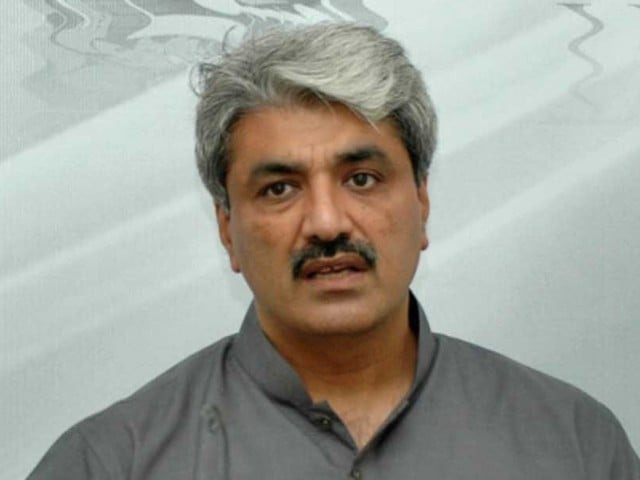Injurious to health: Hospital Waste Management to be expanded to 15 districts
Rafique says the projects in Burewala and Wazirabad have been successful.

Adviser to Chief Minister on Health Khwaja Salman Rafique says the projects in Burewala and Wazirabad have been successful. PHOTO: WASEEM NIAZ
The Hospital Waste Management pilot project has been successfully completed in Burewala tehsil headquarters hospital, Layyah district, and Wazirabad tehsil headquarters hospital, Gujranwala district. The project will now be extended to 15 districts in the second phase. All the divisional, district and hospital level committees for the project have been notified about this decision.
The Health Department has prepared a comprehensive policy for managing hospital waste, Adviser to Chief Minister on Health Khawaja Salman Rafique said at a seminar on Environmental Health and Medical Waste Management on Wednesday.
The seminar was organised by the Health Department, the Policy and Strategic Planning Unit (PSPU) and the World Bank.
Health Secretary Jawwad Rafique Malik, Health Services Director General Zahid Pervaiz, World Bank representative Dr Javed, Chief Minister Health Roadmap Programme in-charge Aizaz Akhtar, PSPU Director Ali Bahadur Qazi and Environment DG Javed Iqbal attended the seminar.
Dr Javed said environmental depredation and water pollution was the primary source of disease in the province. He said an ailing person could not work to feed his family and that was an economic loss.
He said hospital waste was hazardous for the environment. He said hospital waste also created hurdles to economic activity.
The medical superintendents of THQ hospitals in Wazirabad and Burewala shared their experiences of the Hospital Waste Management pilot programme. Health Secretary Malik stressed the need for training and capacity building of the staff. He stressed the need for data collection of hospital waste and said manual entries in registers must be uploaded onto a computerised database.
He said the Punjab Information Technology Board could help them develop software to collate their hospital waste management data.
He observed that strict monitoring was essential to check pilferage and theft of hospital waste.
Malik stressed the need for proper training of staff responsible for separating hospital waste into various categories: municipal waste, infectious waste and hazardous hospital waste. He said the Health Department was going to launch a massive Hospital Waste Management project in collaboration with the Lahore Waste Management Company.
Rafique said incinerators with an average capacity of burning 80kg of waste each day had been installed in 24 districts including Lahore, Multan and Rawalpindi.
He said a survey should be conducted in all districts to collect accurate data on hospital waste dumped by the public as well as private hospitals in the province. “Hospital waste management is a serious issue and all stakeholders must focus on devising creative solutions for it.”
He said the government would provide funds for it whenever required. He said there was a need to discharge duties with honesty and professional dedication. He said that monitoring of the Hospital Waste Management Programme was also a component of the Chief Minister’s Health Roadmap Programme and the Special Monitoring Unit (SMU) was using MEAs to monitor the project.
Rafique said the Punjab Healthcare Commission had also included the implementation of Hospital Waste Management rules to maintain minimum service delivery standards. He urged health managers, medical superintendents and health EDOs to ensure the implementation of SOPs for Hospital Waste Management.
Dengue-free Punjab
The month of September is crucial for ensuring preventative measures against a dengue fever epidemic, Post Graduate Medical Institute Principal Khalid Mahmood said on Wednesday.
Mahmood was presiding over a meeting of the Lahore General Hospital’s administrative staff. He said raising awareness and sensitising people about the importance of cleanliness and hygiene would guaranty a “dengue-free Punjab”.
He said the LGH had always played a leading role in dengue mosquito eradication campaigns as well as anti-polio and anti-measles drives.
Mahmood said there was not a single doctor, nurse or paramedic at the LGH who had not received training in handling dengue fever patients. He said the PGMI had even trained doctors from other provinces on how to handle such patients. He said it was due to the chief minister’s commitment and efforts that there had been no deaths from dengue fever in the Punjab during the last three years.
Mahmood urged administrative doctors to take rounds in wards and corridors of the hospital instead of sitting in their rooms and to monitor cleanliness arrangements at the hospital.
Published in The Express Tribune, September 10th, 2015.



















COMMENTS
Comments are moderated and generally will be posted if they are on-topic and not abusive.
For more information, please see our Comments FAQ